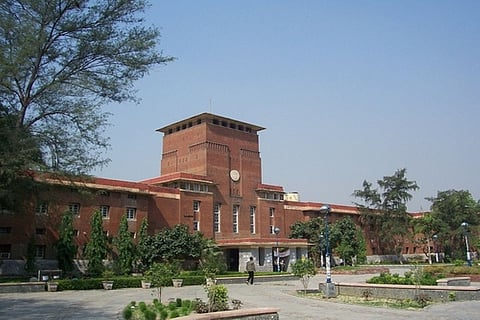

As fourth-year classes get underway this month at the University of Delhi (DU), the cracks in its ambitious Four-Year Undergraduate Programme (FYUP) are widening into fissures. What began in 2022 as an effort to align with the National Education Policy (NEP) 2020, promising flexibility and research exposure, is now beset by confusion, staff shortages, and incomplete curricula.
The university’s decision last week to formally offer students an “exit option” after three years has underscored these shortcomings. As per the official notice, those opting out after six semesters will graduate with either a three-year degree or an Honours degree, depending on their stream.
The circular urged students to weigh their goals carefully with faculty guidance, framing this as part of NEP 2020’s multi-exit pathways. Yet, as The New Indian Express highlights, this step also quietly acknowledges DU’s unpreparedness to support a full-fledged fourth year.
At the centre of the discontent are infrastructural and academic gaps. According to Monami Sinha, member of DU’s Standing Committee and Academic Council, colleges have been stretched by a 25% rise in admissions since the 2019 expansion for Economically Weaker Sections (EWS) and a further 20% increase under CUET (Common University Entrance Test) from 2022 to 2024.
With research-heavy fourth-year modules now added, the absence of adequate labs, reading rooms, and staff workspaces threatens the programme’s feasibility.
Faculty member Dr Maya John, elected to the Academic Council, submitted a detailed dissent note to the vice-chancellor on July 5, citing “unplanned policy shifts and a shortage of resources” as undermining the FYUP.
She argued that the delayed February 27 notification of mandatory Generic Electives (GEs) (released only after many students had already entered their final year) violated the Undergraduate Curriculum Framework (UGCF) 2022’s spirit of open interdisciplinary choice. Now, many are scrambling to complete compulsory GEs out of sequence.
Meanwhile, the Bachelor of Commerce (BCom) curriculum has left students puzzled. Although UGCF charts indicate study across “Allied Disciplines”, the course structures show only Commerce as core, raising doubts about eligibility for Minor degrees. Dr John’s note stressed the urgency of a clear clarification from DU.
Adding to the strain is the new expectation of undergraduate dissertations in the fourth year. As Dr John pointed out, supervision hours worth six credits per semester are not reflected in teachers’ workloads, effectively creating a “shadow workload”.
Restrictions on guest faculty hires by DU and the University Grants Commission (UGC) have compounded this, with appointments capped at 20% of sanctioned posts, making it harder to staff additional classes.
The New Indian Express also quoted Rudrashish Chakraborty of Kirori Mal College’s English department, who warned, “There is no infrastructure in colleges to conduct quality research at the UG level... Students are forced to study four taught courses besides having to write a dissertation.”
Academic council member Anumeha Mishra further flagged unrealistic expectations around mandatory publications in scopus-indexed journals within a year.
Abha Dev Habib, General Secretary of the Democratic Teachers Front, was blunt in her criticism, remarking that DU is “trying to pull down the quality of the education by overloading an already vulnerable system”.
As the academic year unfolds, it remains to be seen if the university will address these fundamental concerns or if the FYUP risks becoming — in Dr John’s words — a “mockery of college education”.
